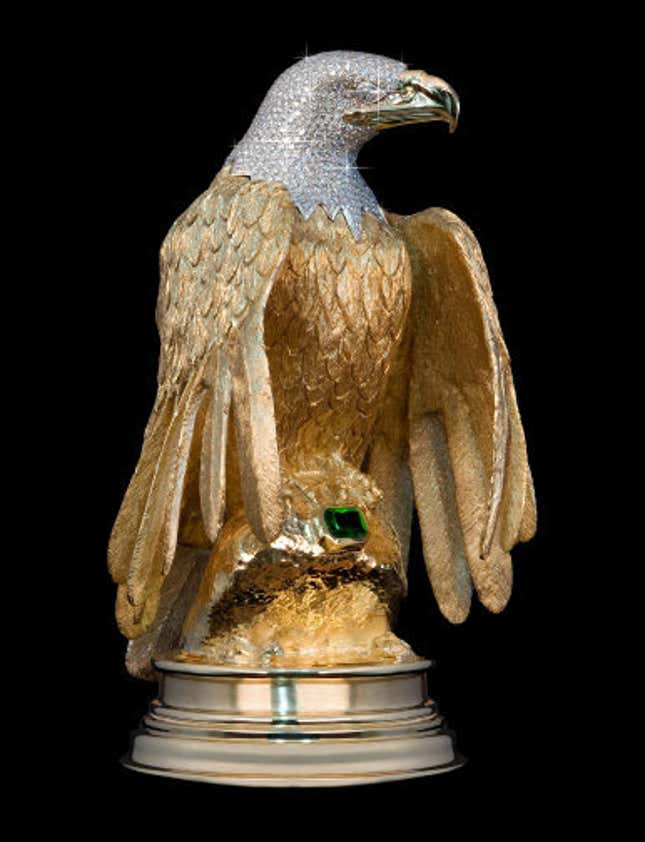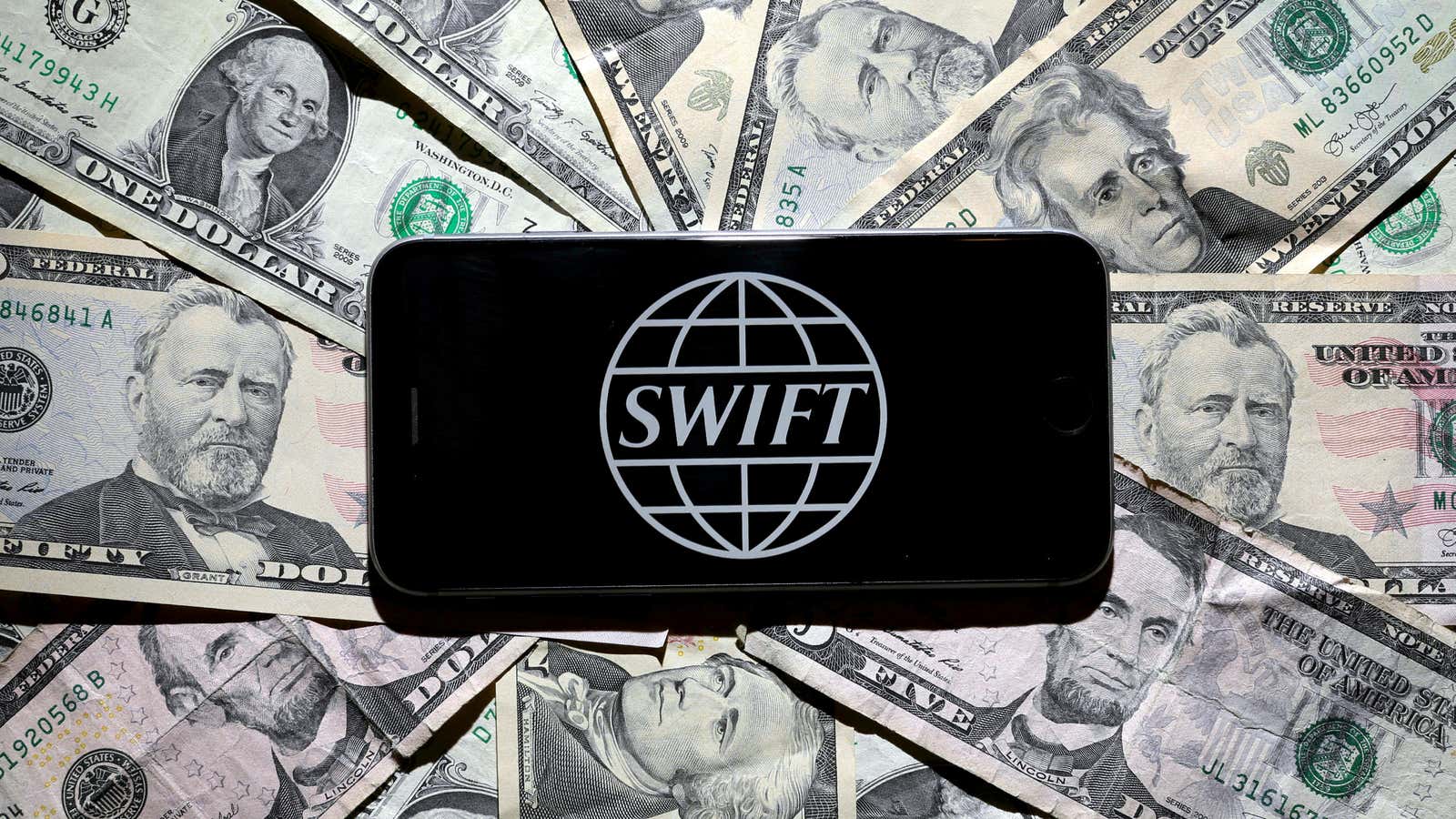It’s been a year of smash-and-grabs, get-aways, infiltrations, intrusions, master schemes, and mad dashes. The heist economy was alive and well in 2016, and our dedicated caper correspondents have kept tabs on the most ambitious acts of larceny and loose morals in the global economy. To wit, here’s your year in heists and capers:
The Golden Bucket Bandit
A man, no plan, and a bucket of gold weighing 86 lbs. Authorities say that Juan Nivelo is a career thief who stumbled upon the take of a lifetime. The Ecuadorian was in the right place at the right time when he spotted an untended armored truck parked on the street in New York City. Spying a bucket of gold flakes worth $1.6 million sitting in the truck, Nivelo simply hoisted it up and walked (slowly) away. The guard didn’t even notice the gold was missing. The police now suspect that Nivelo has fled to southern California with his takings. He is still at large.
The Kardashian Krisis
Living your life on social media can attract the wrong kind of attention, especially if you’re showing off your valuables. Kim Kardashian, the reality-TV celebrity with a very lucrative public life, was the victim of a frightening crime in Paris in October when two men, apparently disguised as police officers, burst into her luxury apartment, tied her up, and stole $9 million worth of jewelry before escaping. Targeting Kardashian specifically during Paris Fashion Week, the thieves forced a concierge at gunpoint to reveal her room’s location. While the city of Paris is no stranger to elaborate jewel heists, the victim’s celebrity had officials worried that the robbery would put a damper on high-end tourism. The thieves are still at large.
The Japanese Cash-Machine Junket
It’s a classic of the modern heist genre: Convince ATMs to spit out cash at the exact time your accomplices are in place to collect it. A 2013 version of this heist inspired the original edition of this post. This year, the scene is set in Japan, where thieves used spoofed credit cards to steal more than $13 million from Standard Bank of South Africa in just three hours. A team of one hundred criminals pulled the money out at banks across the country before the banks could be alerted to stop them. Two men were arrested shortly after the heist, but Japanese authorities have yet to reveal further details; reportedly, a Chinese criminal organization is suspected of having taken advantage of Japan’s lax cybersercurity.
The Queens Rooftop Rumble
Tunneling into a bank vault is a classic move. The 2016 twist? Go in through the roof. A group of thieves in New York City found an opportunity to do just that, cutting through the roof of Maspeth Federal Savings Bank over a May weekend to ransack clients’ safe-deposit boxes and snatch free cash. A neighbor of the bank called police to report the suspicious appearance of a black-painted ladder in his backyard and a box on the roof of the bank. According to the New York Times, police declined to investigate, telling the the man that he was the proud owner of a new ladder. The robbery was discovered two days later when the bank re-opened, and the box the neighbor spotted turned out to be one of many empty safe-deposit boxes left on the roof. The thieves are linked to nine other rooftop bank robberies, and are still at large.
The North Korean Flag Fracas
We’ll briefly turn this one over to Radio Free Asia: “In the city of Chongjin, North Korea, the night of April 15 looked like the perfect time for a caper or an act of treason.” Turns out there was no need to choose, because on the holiday celebrating the birth of regime founder Kim Il Sung, someone stole a national flag from in front of city hall, and as RFA notes, “In North Korea that is both a caper and an act of treason.” While a stolen flag may not sound like much, this act of political derring-do brings terrible risk in the insular dictatorship run by Kim’s grandson, Kim Jong Un. Just look at the sad example of Otto Warmbier, an American student traveling in North Korea, who was sentenced to 15 years of hard labor this year after confessing in a show trial that he attempted to steal a propaganda banner from a hotel. Diplomatic attempts to release Warmbier have gone nowhere so far, and it’s not known who took the national flag from Chongjin city hall.

The Golden Eagle Grab
Maltese Falcon, meet the Vancouver Eagle. This baffling tale features self-described treasure hunter Ron Shore, who created a golden eagle statue to raise money for breast cancer charities following his sister’s death from the disease.

The eagle, reportedly worth $6 to $8 million, was inlaid with jewels, including the Atocha Star Emerald, which was recovered from a sunken Spanish galleon in 1985. While Shore was in the process of selling the eagle to benefit charity, he was robbed by two men in the street who made off with the rare raptor. As the police investigated, the existence of several silver decoy Eagles was also revealed, and past associates questioned Shore’s honesty and his lax security procedures. Shore has offered a $10,000 reward for the return of the eagle, saying “the public can rest assured that under no circumstances is this an insurance scheme or attempt to receive insurance funds.” The eagle is still outside the nest.
The Bangladesh Bank Bits Bilking
Most hackers go after bank accounts held by consumers or companies—but the perpetrators of this heist went after a country’s bank account instead. In February, one of the most avaricious hacks ever happened when criminals obtained the digital credentials of the Central Bank of Bangladesh. They then used the global inter-bank transfer system known as SWIFT to request almost $1 billion dollars of reserves kept in the New York Federal Reserve Bank to private accounts at several Asian banks. A typo alerted New York Fed workers and some scrambling Bangladeshi officials to cancel most of the transfers, but not before the thieves made off with $81 million dollars, siphoned out of bank accounts in the Philippines. The debacle raised questions about the integrity of the global financial system and security procedures in New York City and Dhaka alike. Investigators are still attempting to find the culprits, and one investigator recently told Reuters that the hackers likely had help on the inside of the Bangladeshi bank.
The Million-Dollar Eel Endeavor
With its vast immigrant population, New York City is home to a stunning variety of cuisines, some of which are legal and others are not. This sometimes leads smugglers to sneak invasive or endangered species past animal-trafficking cops. In this case, a $1 million shipment of frozen BBQ eels arrived in a New Jersey warehouse legally, but three cooks used falsified papers to receive the eels before their rightful owners could pick them up. Working with the police, the rightful owner managed to spring a sting on the crooks when he found several men looking to offload a large volume of eel at cut rates. After being led to the warehouse where his goods were found, police arrested the crooks and seized the eel-vidence.
The Russian Data Rustlers
The most consequential heist of the year didn’t end with the loss of dollars, jewels, or gold bullion—just an election. Hackers known as “Fancy Bear” and “Cozy Bear” working for Russian intelligence services made off with email messages from Democratic party officials, including Hillary Clinton’s campaign chairman John Podesta, in a series of “spear-fishing” attacks that tricked users into giving up their passwords. Lax and lagging security responses allowed the exploits to remain active for months. The -mails, shared with the public by Wikileaks, proved a damaging distraction to Clinton’s campaign, and while the psuedo-scandals that emerged were not the sole reason the Democratic party lost, the incredibly close election may have been swayed by the hacking. US intelligence officials and lawmakers have called for further investigation into the role of Russian hacking in the election, but it’s not clear if the Trump administration, which has close ties to Vladimir Putin’s regime, will back such an inquiry. Some security experts fear that the hacking would not have been limited to one party, and that material damaging to Trump and the Republican party may still be used to Russia’s advantage.
